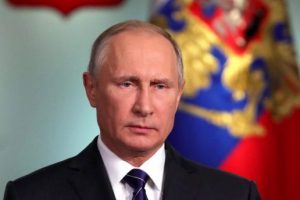 US relations with Russia have entered a period of “uncertainty” as Moscow appears determined to sow discord within Europe and undermine US influence, NATO’s top commander warned.
US relations with Russia have entered a period of “uncertainty” as Moscow appears determined to sow discord within Europe and undermine US influence, NATO’s top commander warned.
“The relationship with Russia is likely to be more difficult to manage in coming years than any time since the end of the Cold War,” General John Craddock told a congressional hearing in written testimony.
Citing Russia’s military action supporting breakaway regions in Georgia in August 2008 and disputes over gas supplies to Europe in January this year, Craddock wrote Moscow’s actions “suggest that their overall intent may be to weaken European solidarity and systematically reduce US influence.”
The stark warning comes as President Barack Obama’s administration seeks to reduce tensions with Russia, suggesting possible concessions on plans for a missile defense system in Central Europe in exchange for Moscow’s support on diplomacy over Iran’s nuclear program.
Obama is due to meet his Russian counterpart, Dmitry Medvedev, for the first time at the Group of 20 summit in London on April 2.
Craddock, who also serves as head of US European command, told the Senate Armed Services Committee that Russia had adopted a “newly assertive posture” towards its neighbors and to European states that rely on Russian energy.
“We are in a time of uncertainty in the US-Russian relationship brought about by disagreements over European security, Russia’s role in what it regards as its neighborhood, and Russia’s decision to send forces into Georgia and to recognize the breakaway regions of South Ossetia and Abkhazia,” he wrote.
The refusal of other neighboring countries to back Russia’s recognition of South Ossetia and Abkhazia reflected “regional unease over a revanchist Russia,” the commander said.
The US military sought “a pragmatic military-to-military relationship” and hoped that talks with Russian counterparts would resume soon, he said.
Russia’s actions in Georgia had altered the assumptions of the post-Cold War era that borders in the region were no longer under threat, the general told lawmakers.
“My judgment in that is that the events of last August in Georgia essentially changed the assumption that we made 15 years ago or more.
“And the assumption after the end of the Cold War and the dissolution of the Soviet Union and the Warsaw Pact was that there were no borders that were under threat of invasion in Europe and Eurasia, that that would not be the case,” he said.
“And I think that assumption has been now proven false.”
While Washington has planned to reduce the size of US forces stationed in Europe, Craddock said he recommended army brigades designated to return in coming years should remain, saying they contribute to “deterrence efforts” — though he did not mention Russia.
Tensions rose meanwhile between Russia and Ukraine after Moscow expressed anger over Kiev’s agreement with the European Union for investment in its gas pipeline network.
Russia’s reaction revived fears of a repeat of a gas dispute in January which left a dozen EU countries without energy supplies.
Dan De Luce
sursa: uk.news.yahoo.com












Adauga comentariu